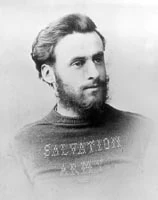
Herbert Howard Booth
Biography[]
Herbert Howard Booth was the fifth of William and Catherine Booth's eight children. Born in 1862, he was in his mid-teens when the Christian Mission started by his parents in the East End of London was transformed into the Salvation Army. Herbert, like his siblings, was thrown into the thick of the battles which raged around the new movement. At the age of 22, after two turbulent years helping his older sister Kate set up operations in France, he was put in charge of cadet officer training in England.
Song Writing[]
Herbert wrote many songs that are sung by Salvationists around the world. He was a gifted musician, a key skill in an organisation so immersed in music. He also organised large spectaculars, such as the annual anniversary celebration at the Crystal Palace in London, where attendances at times reached 70,000 and Salvation Army massed bands and songster brigades (choirs) performed under Herbert's baton. Ever looking for new ways to communicate with audiences, he pioneered the use of the magic lantern by the Salvation Army in England.
Officer Service[]
After becoming ill in 1886, Herbert Booth was sent on a long sea voyage to recuperate. He visited Australia and saw first hand the innovations that the Army were making under James Barker. He forged a sentimental link with the country and while resting in a mining town in Western Australia found a gold nugget that he had made into a ring for his future wife Cornelie Schoch, a Dutch Salvationist.
When only 26 Herbert took command of all Army operations in the British Isles. However, in 1892 conflict with his bureaucratic older brother Bramwell, his superior as the Chief of the Staff, led to his departure from England once again. For four years, Herbert, with the personal title of ‘Commandant’, lead the Salvation Army in Canada. Then in 1896, at the age of 34, he was appointed to take over the Australasian Territory. It proved a good move on two counts. It placed him several thousand more miles from Bramwell and on his arrival he found a flourishing Limelight Department operating under Joe Perry. Unlike his predecessor Thomas Coombs, Herbert involved himself personally in the Department's activities. However, Herbert continued to suffer severe health problems. Letters from his father refer to Herbert's "terrible depressions", and his periods of intense, almost feverish activity were invariably followed by slumps in health and spirit.
Herbert confirmed his enthusiasm for the magic lantern by quickly authorising a major expansion of personnel and equipment for the Limelight Department. More importantly, moving pictures, a new invention, was astonishing Melbourne at this time and Herbert immediately instructed Joe Perry to buy the equipment and build the facilities to get the Department into this new medium. By late 1897, the first "actualities" were made, and by May the following year, Australia's first fictional narrative film was produced.
By late 1898, Herbert, together with Perry, had put together Social Salvation, a two and a half hour multimedia presentation, which used films, slides and music to depict the social work of the Army in Australasia. He updated and presented this production throughout the remainder of his command here. Cornelie also became an enthusiast and often travelled around Australia presenting her own lectures, including "The Slums Of The Great Cities", illustrated with hand coloured slides made at the Salvation Army studios.
Relationship Breakdown[]
In February 1899, General William Booth made his third visit to Australia. Herbert, whose relations with Bramwell had gone from bad to worse, hoped that some close contact with his father might help heal his rift with London. It didn’t. The old man had total confidence in Bramwell and left Herbert and Cornelie "utterly dispirited and broken-hearted." To help shake off the depression, Herbert threw himself into a period of frenetic activity. Seventy projects were launched to celebrate his father's seventieth birthday. One of these was the building of a new large officer training garrison at Victoria Parade, East Melbourne. To enlist trainees, Herbert produced a recruiting show that featured stories of early Christian martyrs. Soldiers of the Cross, written and directed by Herbert, with Joe Perry as cinematographer, premiered at the Melbourne Town Hall on 13 September, 1900.
Early in 1901, the strain on Herbert from his deteriorating relations with his father and Bramwell became intolerable. At first he decided he needed a complete break from high command, but while resting in a Salvation Army property on the Collie River in Western Australia, he decided to leave the organisation. He was not the first Booth to resign and so he knew this would mean ostracism from the family. Nevertheless, he decided to go, but wanted to take Soldiers of the Cross with him. Negotiations with Bramwell were drawn out, but in the end, it was agreed that payment would be the transfer to the Salvation Army of the copyright to all the songs he had written during his early years with the Salvation Army. Herbert and Cornelie sailed for San Francisco, and a new life, in August 1902.
See also[]
- Officer of The Salvation Army
- The Booth Family
- Booth Family Tree
- Commons:File:Herbert Howard Booth 1886.jpg
- Wikipedia:Herbert Booth
| This page uses content from Sawiki.net. The original article was at Herbert Booth. The list of authors can be seen in the page history. Sawiki.net articles are licensed under Attribution-NonCommercial-ShareAlike 2.5 |